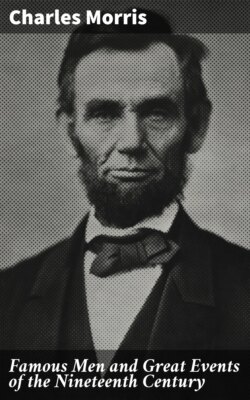Читать книгу Famous Men and Great Events of the Nineteenth Century - Charles Morris - Страница 17
На сайте Литреса книга снята с продажи.
ОглавлениеHow the Reform Bill Was Passed
The result was one barely short of civil war. The people rose in fury, determined upon reform or revolution. Organized unions sprang up in every town. Threats of marching an army upon London were made. Lord Wellington was mobbed in the streets and was in peril of his life. The maddened populace went so far as to curse and stone the king himself, one stone striking him in the forehead. The country was indeed on the verge of insurrection against the government, and unless quick action was taken it was impossible to foresee the result.
William IV., perhaps with the recent experience of Charles X. of France before his eyes, gave way, and promised to create enough new peers to insure the passing of the bill. To escape this unwelcome necessity Wellington and others of the Tories agreed to stay away from Parliament, and the Lords, pocketing their dignity as best they could, passed the bill by a safe majority, and reform was attained. Similar bills were passed for Scotland and Ireland, and thus was achieved the greatest measure of reform in the history of the British Parliament. It was essentially a revolution, the first great step in the evolution of a truly representative assembly in Great Britain.
The Extension of the Suffrage
The second great step was taken in 1867, in response to a popular demonstration almost as great and threatening as that of 1830. The Tories themselves, under their leader Mr. Disraeli, were obliged to bring in this bill, which extended the suffrage to millions of the people, and made it almost universal among the commercial and industrial classes. Nearly twenty years later, in 1884, a new crusade was made in favor of the extension of the suffrage to agricultural laborers, previously disfranchised. The accomplishment of this reform ended the great struggle, and for the first time in their history the people of Great Britain were adequately represented in their Parliament, which had ceased to be the instrument of a class and at last stood for the whole commonwealth.
The question of Parliamentary reform settled, a second great question, that of the Corn Laws, rose up prominently before the people. It was one that appealed more immediately to them than that of representation. The benefits to come from the latter were distant and problematical; those to come from a repeal of the Corn Laws were evident and immediate. Every poor man and woman felt each day of his life the crushing effect of these laws, which bore upon the food on their tables, making still more scarce and high-priced their scanty means of existence.
The Corn Laws
For centuries commerce in grain had been a subject of legislation. In 1361 its exportation from England was forbidden, and in 1463 its importation was prohibited unless the price of wheat was greater than 6s. 3d. per quarter. As time went on changes were made in these laws, but the tariff charges kept up the price of grain until late in the nineteenth century, and added greatly to the miseries of the working classes.
The farming land of England was not held by the common people, but by the aristocracy, who fought bitterly against the repeal of the Corn Laws, which, by laying a large duty on grain, added materially to their profits. But while the aristocrats were benefited, the workers suffered, the price of the loaf being decidedly raised and their scanty fare correspondingly diminished.
Cobden and the Anti-Corn Law Crusade
Great Britain Adopts Free Trade
More than once they rose in riot against these laws, and occasional changes were made in them, but many years passed after the era of parliamentary reform before public opinion prevailed in this second field of effort. Richard Cobden, one of the greatest of England’s orators, was the apostle of the crusade against these misery-producing laws. He advocated their repeal with a power and influence that in time grew irresistible. He was not affiliated with either of the great parties, but stood apart as an independent Radical, a man with a party of his own, and that party, Free Trade. For the crusade against the Corn Laws widened into one against the whole principle of protection. Backed by the public demand for cheap food, the movement went on, until in 1846 Cobden brought over to his side the government forces under Sir Robert Peel, by whose aid the Corn Laws were swept away and the ports of England thrown open to the free entrance of food from any part of the world. The result was a serious one to English agriculture, but it was of great benefit to the English people in their status as the greatest of manufacturing and commercial nations. Supplying the world with goods, as they did, it was but just that the world should supply them with food. Great Britain Adopts Free TradeWith the repeal of the duties on grain the whole system of protection was dropped and in its place was adopted that system of free trade in which Great Britain stands alone among the nations of the world. It was a system especially adapted to a nation whose market was the world at large, and under it British commerce spread and flourished until it became one of the wonders of the world.
